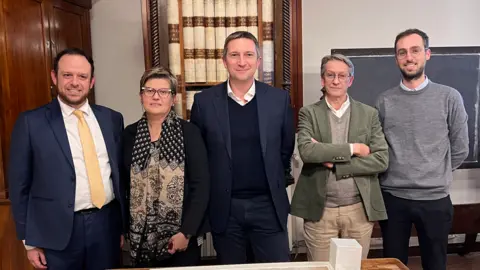University restores historic Venetian record
 University of Warwick
University of WarwickA 14th Century Venetian parchment has been restored by a team from the University of Warwick.
The document, which had been thought lost for more than 70 years, records the activities of merchants who followed in the footsteps of Marco Polo into Asia in the decade following his death.
Professor Luca Mola, Director at the Warwick Venice Centre, said it was a "unique window into the active trade routes that brought east and west together" between the 13th and 15th centuries.
The university said the parchment was also the earliest proof that a major new European invention of the time, the mechanical clock, was brought to Asia.
The document details the travels, investments and commercial enterprises of six Venetian nobles who returned from China and then set off for the Sultanate of Delhi in 1338.
Prof Mola, who rediscovered the document said it had been "exciting to analyse in detail such a rich testimony of the connections between Europe and Asia taking place".
 University of Warwick
University of WarwickA professional restorer, Luana Franceschet, was brought in to restore it and the repaired parchment was then placed on display at the Venice State Archives.
Professor Andrea Erboso, director of the archives said: "Through taking Marco Polo as a starting point and restoring this particular parchment, we enlarge our point of view significantly. "
Prof Mola said it would be a starting point for further study and would "enrich our knowledge of a period in history when cross-continental connections were based on the exchange of goods and know-how, with reciprocal benefits."
The university said the document gave an insight into "how explorative expeditions were financed in the 14th century by small donations, an early version of crowd-source funding".
It also shows how women as well as men donated.
Follow BBC Coventry & Warwickshire on BBC Sounds, Facebook, X and Instagram.
